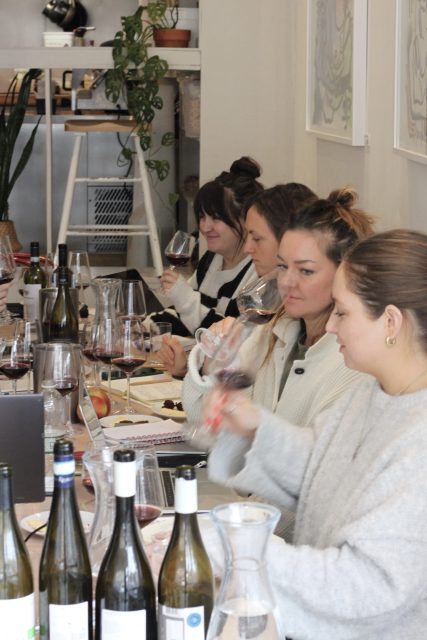This website uses cookies so that we can provide you with the best user experience possible. Cookie information is stored in your browser and performs functions such as recognising you when you return to our website and helping our team to understand which sections of the website you find most interesting and useful.
How to get Gen Z to care about wine
Berkmann Wine Cellars is on a mission to get this generation of on-trade staff buzzing about wine, enlisting the help of a behavioural scientist to do so. But how can we change our educational approach to fit the Gen Z mindset?

“We don’t necessarily need them to be that excited about wine in the first place, but we do need to get them to care about service,” says Bob Davidson, wine training manager for the UK importer.
This is the first step to engage on-trade staff whose perception of wine is not always positive. Make wine a part of service, and the rest will follow. The hope, of course, is that this leads to a “Damascus moment, that lots of people in the wine trade have”, he says.
However, wine consumption among younger consumers is down on previous generations, raising questions about the future of the category.
But Davidson pushes back against the perception that Generation Z has lost interested in wine. “There’s not a shift away from wine, there just isn’t a shift towards it, and there’s other things that are competing for their attention,” he says. “There’s a lot more to do now. Twenty or 30 years ago there was going out and drinking. Now, there’s far more in terms of activities that people can do to vie for their attention.” This, he argues, accounts not only for the decrease in wine consumption among younger consumers, but also for why they are drinking less in general.
But this is no reason to stop training them. By way of an analogy, Davidson says, “plenty of front of house staff are vegetarian. It would be mad to say they can’t sell steaks, or to say they can’t talk people through the specials board. It’s exactly the same.”
In the face of changes to the on-trade workforce, Berkmann Wine Cellars has relaunched its Veraison training programme. First launched in 2016 as a training platform for the on-trade, the concept was to break down learning into bite-sized chunks for staff to engage with between services.
But the on-trade now looks very different to its pre-Covid self, and the wine importer has revamped its education platform to keep up with the times.
Davidson joined the team as wine training manager just over a year ago, and set to work reshaping the curriculum and making it more Gen Z-friendly.
Although the training is not “necessarily generationally specific”, he says, “realistically, [Gen Z] make up a large portion of people in hospitality, so it would always naturally have to be geared towards them”.

Gearing the training towards a Gen Z audience means two things: making the programme more tech-friendly, and making it more emotion-led.
The first part is simple — Berkmann has introduced a new e-learning platform and a Veraison app, featuring elements of gamification which acknowledge the behaviours and preferences of a younger, digital-first audience.
The importer then enlisted the help of a psychologist to engage with this second objective.
Behavioural scientist Dr Rachael Skews says of Gen Z: “They’re looking for a different psychological contract with an employer. And so what they really want is to have a more meaningful work experience.”
She continues: “As a psychologist, I think this is great. I think that this is a really positive thing about the workplace; they’re not willing to work themselves to the point of burnout, and they want a much better work life balance.”
But how to implement that in the programme? “How that related to the way that we approached this training was in making sure that they feel that this is for them, and it represents them,” Skews says.
Veraison’s latest iteration encourages a more intimate connection by asking hospitality staff to co-create their own language around wine, guided by the programme’s educators. It also puts empathy, with both customers and fellow staff, at the heart of training. “we got people actually reflecting on their own experiences, like what makes a really good night out for you,” Skews explains.
Inclusivity was also a factor to consider.
Skews says: “It wasn’t material that needed a lot of shaping in that way, but my personal view is that there’s always more that you can do to think about being as inclusive as possible.”
Lowering the reading age of content on the platform is one way to increase inclusivity, particularly to those with learning difficulties, or who may come from a lower socioeconomic status, Skews explains.
Beyond these barriers, it’s also about creating what Skews calls a “psychologically safe space within the training environment”.
Davidson reflects on “the number of times we go into places, and they’ve never used a corkscrew before”.
“I was talking to someone who had been in the job for three months and she only sold screwcap wines, because she didn’t know how to use a corkscrew,” he says. “We need to try and make it less intimidating.”
The ultimate goal, then, is not to convince a whole generation of workers to love wine. “They don’t even need to be big wine drinkers or wine lovers,” Davidson says. Instead, it’s about reshaping the on-trade working environment to keep up with a Gen Z mindset — one which values personal experience and a work-life balance. He adds: “they just need to understand that it is important for other people, and to connect with them.”

